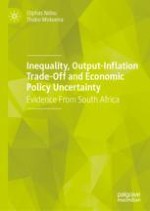2019 | OriginalPaper | Buchkapitel
3. Does the Inflation Rate Below 4.5% Matter for the Distributional Effects of Positive Inflation Shocks on Income Inequality in South Africa?
verfasst von : Eliphas Ndou, Thabo Mokoena
Erschienen in: Inequality, Output-Inflation Trade-Off and Economic Policy Uncertainty
Aktivieren Sie unsere intelligente Suche, um passende Fachinhalte oder Patente zu finden.
Wählen Sie Textabschnitte aus um mit Künstlicher Intelligenz passenden Patente zu finden. powered by
Markieren Sie Textabschnitte, um KI-gestützt weitere passende Inhalte zu finden. powered by
